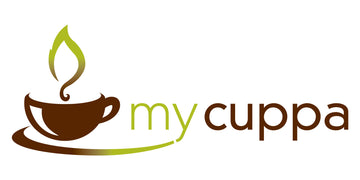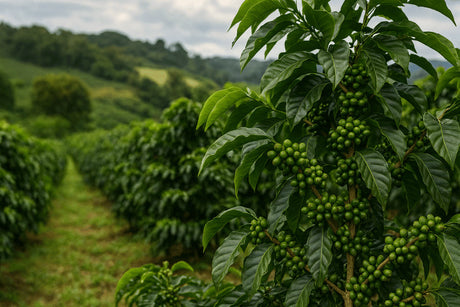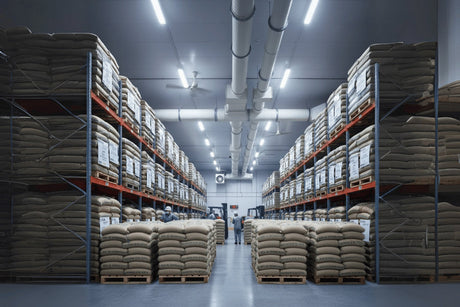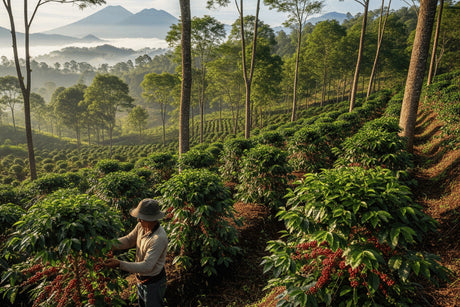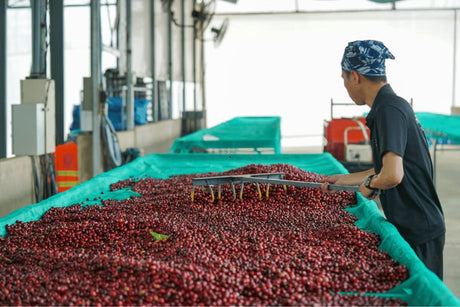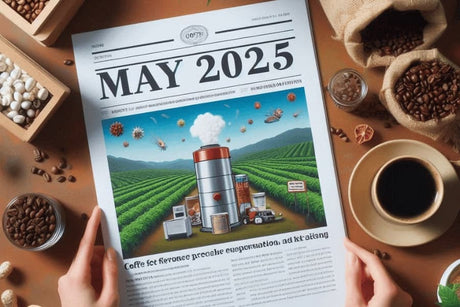mycuppa January 2015 Newsletter
Happy New Year to all our wonderful customers.
Earlier in 2014, we outlined what was happening to the price of raw coffee.
A drought in Brazil (the largest producer), another season of the terrible Coffee Leaf Rust (Roya) epidemic in Central and Southern America decimating 30+% of crops and the lower yields from Sumatra and Ethiopia all combined to create too much "really bad news" by adding to the supply deficit against expected demand.
We all know commodities are priced using supply versus demand.
This bad news created a "perfect storm" for commodity traders by aggressively attacking Arabica futures contracts - buying up to 4 times the physical crop and artificially (or speculatively) driving up demand.
Commodity traders love volatile markets - they make money on a rising or falling demand if their positions are set appropriately.
Alas, coffee roasters lose as we are forced to pay the ransoms.
So what happened in 2014?
Forecasts of Brazil's harvest being lower allowed traders to start panic buying future contracts.
This led to price spikes, with rises of up to 64% in Q1 2014.
It's important to point out here that the farmers are not getting that much more for their crops; it's just the trading benchmark reference (C-index) shifts considerably, so "parties in the middle" end up profiting whilst coffee roasters pay the ransom - roasters need coffee so we pay whatever it takes.
Throughout 2014, the price of raw coffee continued to rise.
The C-Index played its normal volatile game of rise & fall, but the overall average meant coffee roasters were paying around $2.80 per kilo extra for quality raw arabica coffees.
For some origins, e.g. Sumatra, it was much higher.
The process of roasting coffee resulted in a loss (moisture) of around 18%.
Therefore, the effective price impact was approximately $3.45+ per kilo.
Fast forward to January 2015, and the raw coffee brokers are now playing a new game - currency devaluation.
As coffee is typically a bi-annual crop, the last set of main harvest contracts in September - October 2014 was written when the Aussie Dollar (AUD) traded around US 0.95 cents.
All raw coffees are traded in US dollars.
Farmers are not going to drop the price of their crop, so with the $AUD falling to US 0.78 cents, we are now faced with a 15% increase in raw coffee for shipments landing in Australia in 2015.
So, what does this mean for the retail price of roasted coffee?
Good question.
It's sure as heck keeping me awake every night at the moment.
We are more sensitive to movements in the price of raw coffees compared to the fat margins operating, with many of our competitors selling equivalent or lower grades for $10 to $15 per kilo more than we charge.
Obviously, they have more margin buffer
In a rising market, like what we have been dealing with for almost ten months, our business gets squeezed.
There are price adjustments underway at the moment.
These are in direct response to higher input costs, and whilst not proportionate (technically, we should be trading around $6 per kilo higher across the board), they are of a magnitude that the whole industry cannot ignore, nor can the industry engineer a solution that mitigates higher prices - in a highly competitive market, quality is what sets you apart in the Australian coffee market and dropping standards (cost) is risky and foolish) strategy.
Rest assured, we know how to play this game; having been through this roller-coaster a few times - we continue to seek the best qualities as this is what builds an enduring business.
Picks for Jan 2015
2014 had not been so kind to Brazil.
We selected the best lots on offer, and now the forward story is much better.
Colombia, Guatemala and Ethiopia keep on kicking big goals, and we have gone long on specialty Guatemala - it's just superb.
In mid-Feb 2015, a truly spectacular Colombian will land in our warehouse - it's a winner.
New season Rwanda Inzovu arrived in our warehouse mid-Jan 2015, and it's a cracker (86 points) - soft lime and mild floral note in aroma, nice citric acidity, great balance, dark fruits, intense honey-like sweetness, full body, cocoa and chocolate finish (superb).
We have also taken 4 tons of India Tiger Mountain.
For those of you who have not tried Indian coffee - it is the best-kept secret in the coffee world.
Indian coffees have a rich classic coffee flavour (strong) with spice, nippy acidity and the best chocolate finish in milk-based espresso.

Update regarding freight performance
Unfortunately, the news is not good, I'm afraid - but there is some light at the end of the tunnel and conditions are improving.
In our November 2014 newsletter, we reported some serious issues regarding parcel freight services across Australia.
Since then, we have not seen any reasonable levels of improvement despite vigorous (and formal) complaints to Australia Post management.
The problems are caused by Australia Post implementing automatic dimension weighing systems in their major state hubs for VIC and NSW.
This change continues to result in congestion within each state hub as parcels are not being processed efficiently through the new X-ray systems.
At times, we see delays of up to 3 days being imposed on transit timeframes as a result of AusPost internal congestion.
We also noted the periodic failures by Australia Post in sending our customers important tracking notification emails.
Again, this is causing added levels of anxiety amongst our customers as it would appear to some customer that we have not yet sent their parcels, which is not the case.
It is important to understand that parcel freight within Australia is unlikely to return to previous performance levels we experienced before August 2014 - at least not in the short term.
Congestion that previously only occurred around the holiday periods is now the norm.
As AusPost have an entire market monopoly on consumer parcel freight, they have zero incentive to improve performance metrics or customer support levels.
Our advice remains the same - expectations you have held for freight performance in the past are no longer valid, and you need to factor that situation into your ordering timeframes.
Again, we stress this is not an isolated mycuppa issue - it's endemic across the entire online segment, and no merchants are immune.

2015 = bigger and better
In early Jan 2015, we were mighty relieved to finally sign contracts for the purchase of a new factory in Melbourne, VIC - our second owned site.
It has been a huge exercise over the last 18 months to find a suitable premise (I had given up many times because of the lack of available gas capacity in most commercial properties with less than 1.8% of factories in Melbourne having access to sufficient Natural gas capacity).
During the search, we also evaluated many new roasting plants.
We selected an innovative, custom-built platform that will be installed in a state-of-the-art facility - further improving our position in the market as a leader of premium quality coffees.
It's a large project that will take around 10 months. As Australia's largest online supplier of freshly roasted coffee, mycuppa is a 24/7 operational service and we cannot afford even a single day of downtime.
The new facility represents a multimillion-dollar investment for mycuppa.
